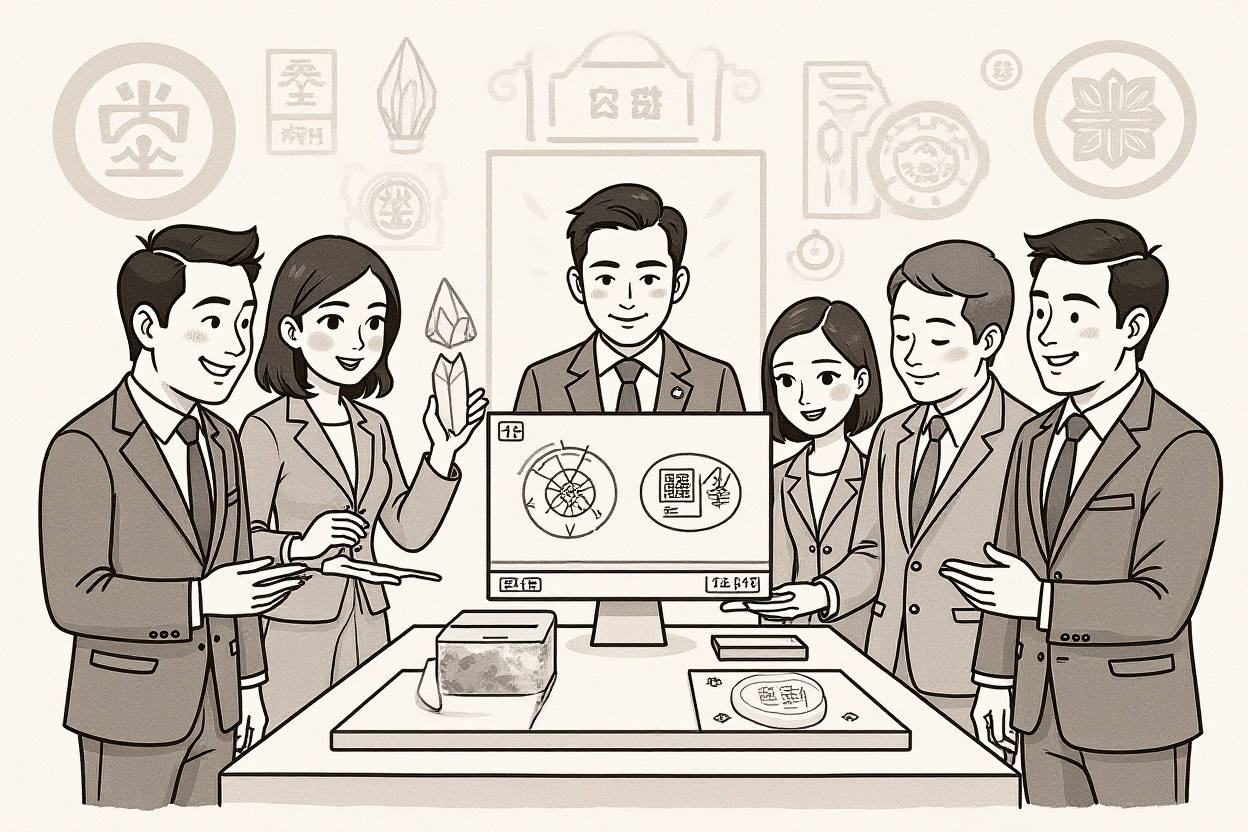When uncertainty arises, some turn to metaphysics. Recent revelations from automotive influencers show that car manufacturers are increasingly relying on traditional Chinese practices for strategic decisions. Companies choose Chengdu for launches seeking the luck of ‘City of Success’ (成功之都), while SAIC-GM attributes Guangdong’s sales miracles to ‘southern wealth gathering’ principles. These seemingly superstitious location strategies are quietly spreading throughout the industry. This fascination with 风水 (feng shui) isn’t limited to automakers. In Hong Kong, top tycoons have long embraced feng shui as essential guidance for office layouts and corporate naming. Mainland real estate developers similarly master this art, carefully considering building orientation, entrance positioning, and launch dates to achieve optimal ‘wind gathering, energy accumulation’ (藏风聚气) properties. Foreign interest in Chinese metaphysical practices isn’t new. As early as the 15th century, Chinese immigrants brought feng shui to Southeast Asia. Singapore’s Merlion statue, facing the ocean with banks behind it, is celebrated as an exemplary feng shui configuration. In the United States, over 20 universities including Harvard and Berkeley offer courses on 易经 (I Ching) and feng shui, while Amazon sells more than 40,000 books containing the ‘Fengshui’ keyword translated into multiple languages. Even Donald Trump understood its value. In the 1990s, facing bankruptcy, he invited Hong Kong feng shui masters to redesign Trump International Hotel Tower, changing the main entrance from south-facing to east-facing and installing a giant metal sphere in front of the building to ‘transfer negative energy.’ In the AI era, platforms from ChatGPT to DeepSeek have become digital fortune-tellers. Users simply input birth dates and metaphysical commands, and AI generates complete ‘life scripts’ covering personality, career, wealth, relationships, and even daily predictions. FateTell represents a company dedicated to providing 八字算命 (Ba Zi fortune telling) services to overseas users through AI. Its founder Xiyuan moved from Hong Kong to Hangzhou’s Liangzhu in 2024 to establish the startup. The brand’s core mission involves using AI to interpret traditional 八字命理 (Ba Zi destiny theory), transforming ancient Chinese wisdom into modern ‘self-exploration tools’ accessible to international users, particularly for analyzing personality, career, and marriage compatibility. FateTell targets overseas Chinese and Western youth curious about Eastern culture, with nearly 60% female users, avoiding the highly competitive domestic market. The company offers ‘Book of Destiny’ and ‘Book of Fortune’ products priced at $39.99 and $19.99 respectively, achieving an impressive 30% customer repurchase rate. Reports indicate FateTell reached breakeven within its first year and completed seed funding round. Many educated young people view metaphysical practices as psychological comfort and self-discovery tools. Industry research predicts substantial global metaphysical application markets, with spiritual products and services reaching $180.18 billion in 2024 and projected to exceed $249 billion by 2032. AI metaphysical applications are becoming significant components of the ’emotional economy’ and ‘spiritual consumption’ sectors, showing particularly strong growth in Europe, America, Japan, South Korea, and Middle Eastern regions. If AI fortune-telling represents the technological side of metaphysical exports, crystal accessories demonstrate supply chain superiority. On TikTok, crystal pendants and feng shui decorations maintain high topic popularity, with related products consistently ranking on cross-border bestseller lists as online traffic efficiently converts to actual sales. Jiangsu’s Donghai County crystal production belt, combined with the Greater Bay Area’s mature e-commerce capabilities, has created an export legend: crystal products costing merely十几元 (a dozen yuan) domestically can sell for thousands of dollars in international markets. Jewelry brand Karma and Luck exemplifies this success. Their amethyst geode feng shui tree sells overseas for $2,000, while similar products might cost only几百元人民币 (a few hundred RMB) domestically. How can they command such premiums? The answer lies in wealth trees, crystal bracelets, and luck charms carrying ‘wealth attraction,’ ‘romance enhancement,’ and ‘good fortune’ labels that easily achieve high markup. Consider Karma and Luck’s $139 purple crystal feng shui tree made from amethyst and copper wire, while domestic equivalents sell for仅20.9元人民币 (only 20.9 RMB), representing approximately 46-fold price premium. Another brand, Buddha Stones, established in 2015, follows a cultural fusion approach incorporating Tibetan Buddhist elements into modern accessory designs. The company achieves annual sales exceeding $8 million with products commanding over 30-times markup. These cases confirm that within the metaphysical consumption wave, Chinese supply chains are leveraging cost advantages and cultural storytelling capabilities to drive an ‘Eastern energy’ commercial revolution globally. Song Xin (宋欣), CEO of Haizhantong/Xinfu Consulting and author of the bestseller ‘Corporate Globalization Practical Handbook,’ told Phoenix Finance that faith or metaphysics-related businesses actually have long histories, but the phenomenon appears more prominent now because manufacturing capabilities remain concentrated in China. She notes that Chinese metaphysical exports started relatively late and still face numerous challenges. For example, in Europe, many premium crystal energy stone brands have decades of history rather than recent emergence. In Yokohama’s Chinatown, Chinese fortune-telling and palm-reading shops occupy significant market share, with considerable cultural heritage behind them. Song believes the world’s three major metaphysical systems—Japanese Zen, Indian yoga, and Western energy stones—have established deep cultural accumulation and commercial mechanisms. Comparatively, Chinese metaphysical products remain mostly in ‘small-scale trial’ phases with relatively simple profit models relying on early-stage traffic-driven e-commerce. Japanese, Indian, and Western schools have constructed complete theoretical systems and business mechanisms, while Chinese approaches remain primarily at the ‘App’ level without forming genuine ‘theories.’ ‘Long-term, if Chinese metaphysics remains merely as impulsive consumption products, it may not sustain market position. After all, people pay premium prices for Zen experiences seeking not the products themselves but spiritual release and comfort,’ Song stated. Behind metaphysical exports lies a crucial driver: TikTok. Today, social platforms including TikTok and Facebook provide global transmission channels for such cultural content. hashtags like #fengshui and #crystals have exceeded billions of views, fostering a thriving global spiritual consumption market. However, the greatest challenge for metaphysical exports remains cultural barriers. Chinese sellers have developed a ‘concept transformation’ strategy: repackaging ‘风水’ (feng shui) as ‘spatial energy studies’ or ‘environmental psychology’; redefining ‘八字算命’ (Ba Zi fortune telling) as ‘personality and destiny analysis’; and explaining ‘辟邪’ (evil avoidance) as ‘negative energy elimination.’ These clever translations and reconstructions make originally unfamiliar Eastern concepts more acceptable. American-Chinese content creator Dear Modern exemplifies this strategy’s success. Originally an ordinary home designer sharing work with limited response on social platforms, he began incorporating Chinese feng shui principles into home transformations,详细讲解 (detailed explanations) of door orientation, courtyard wall construction, and furniture placement effects on occupants’ fortune quickly attracted international attention, now boasting over 3.3 million followers. Many foreign users actively request his ‘feng shui consultations,’ seeking transformation solutions based on specific layouts. Reports indicate the influencer charges $4000 per foreign client for feng shui analysis. Ultimately, metaphysical exports essentially represent emotional value premium games. A American survey shows 43% of adults own some spiritual or faith-related items, with 30% using them daily. While global markets still marvel at Chinese-made hardware products, an Eastern ‘mystical force’ is quietly permeating markets through softer approaches. From Eastern metaphysical wisdom sailing globally to Chinese enterprises establishing worldwide presence, innovation and openness remain core pulses throughout era development. Based in the Bay Area, unlocking new development patterns; looking globally, pursuing new win-win pathways. With this mission, the Phoenix Bay Area Financial Forum 2025 hosted by Phoenix卫视 (Phoenix卫视) and Phoenix网 (Phoenix网) will occur September 23-24 in Guangzhou. Main forum audience registration opened September 24—scan QR codes or click original links to join this intellectual feast. The expansion of Chinese metaphysical practices into global markets represents more than temporary trend—it signals deeper cultural exchange and economic evolution. As economic uncertainties persist worldwide, consumers increasingly seek meaning beyond material possessions, creating sustained demand for spiritual products and services. For investors and business professionals, this sector offers unique opportunities in cultural technology, cross-border e-commerce, and luxury goods segments. The successful companies combine authentic cultural understanding with modern business practices, creating premium brands that resonate across cultural boundaries. As Song Xin noted, the challenge remains moving beyond simple product sales to developing comprehensive philosophical systems that can sustain long-term growth. Companies that can achieve this cultural depth while maintaining commercial viability will likely lead the next phase of metaphysical exports. For international investors watching Chinese markets, these developments demonstrate the continuing innovation within Chinese consumer exports and the growing soft power of Chinese cultural products globally. The metaphysical export phenomenon illustrates how traditional practices can find new relevance and commercial success in digital global markets. The rise of Chinese metaphysical exports offers several important insights for international investors and business leaders. First, it demonstrates the continuing demand for products offering emotional and psychological value, particularly in uncertain economic times. Second, it shows how digital platforms can rapidly accelerate cultural exchange and commercial opportunity. Third, it highlights China’s evolving role as an exporter of cultural products and soft power, not just manufactured goods. Investors should monitor several key factors: regulatory developments affecting metaphysical products, intellectual property protection for cultural exports, and changing consumer preferences in spiritual markets. Companies that successfully navigate these factors while maintaining cultural authenticity may present interesting investment opportunities. The metaphysical export trend also reflects broader shifts in global consumption patterns toward experiences and meaning over mere material possession. This aligns with larger movements in sustainable consumption, wellness industries, and digital transformation of traditional practices. For those interested in deeper analysis of Chinese consumer trends and export opportunities, the upcoming Phoenix Bay Area Financial Forum 2025 in Guangzhou will provide valuable insights and networking opportunities with industry leaders and experts.
Chinese Metaphysical Exports: How Feng Shui and Fortune-Telling Are Capturing Global Markets




